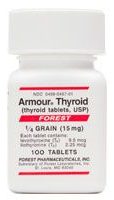Hypothyroidism is a common disorder indicated by under-active thyroid gland i.e. the gland does not produce sufficient amounts of thyroid hormones. Even though everyone can develop hypothyroidism, some people are at a higher risk. You are more likely to develop this disorder if you are a woman older than 60, have an autoimmune disease, have a family history of thyroid problems, or received a treatment with anti-thyroid medications, among other risk factors. Synthroid and Armour Thyroid are well-known therapies for hypothyroidism and this post brings you more details about the two.
 What is Synthroid?
What is Synthroid?
Synthroid whose generic name is levothyroxine is, basically, a replacement for a naturally-produced thyroid hormone that regulates the body’s metabolism and energy. It is the man-made hormone thyroid hormone that most people have to take for life. The active ingredient of this medication is levothyroxine sodium, which is a well-known treatment for hypothyroidism.
The drug is also used to prevent or treat goiter, an abnormal enlargement of the thyroid gland which can be caused by surgery, cancer, radiation treatment, certain medications, and other factors.
According to the official FDA website, Synthroid is a narrow therapeutic index (NTI) medication. What does this mean? Medications categorized as NTI are defined as those drugs where small differences in dose or blood concentration may lead to serious therapeutic failures or adverse effects.
Doctors have been prescribing this medication to their patients for about 50 years, according to the makers of Synthroid. The medication functions to replace or provide thyroxine hormone, which is usually produced by the gland.
When you start taking Synthroid for the very first time, your doctor monitors you closely. For example, the physician usually tests your TSH levels for 6-8 weeks to make sure you are taking the right dose. One of the most common challenges in hypothyroidism treatment is finding the right dose that will yield most benefits.
How to take Synthroid?
 As mentioned above, it can be difficult to find the right dose for patients with hypothyroidism. That is why there is no “one size fits all” rule when it comes to how many capsules you should take a day. The dosage is based on various parameters including your age, weight, medical condition, laboratory test results, and response to the treatment.
As mentioned above, it can be difficult to find the right dose for patients with hypothyroidism. That is why there is no “one size fits all” rule when it comes to how many capsules you should take a day. The dosage is based on various parameters including your age, weight, medical condition, laboratory test results, and response to the treatment.
It is of extreme importance to stick to the dosage that your physician prescribed. To make it easier for yourself, you should create a routine and take Synthroid at the same time every day. This shouldn’t be overly difficult because you are required to take one capsule a day anyway and most people find it easiest to take it in the morning.
Also, you should take Synthroid on an empty stomach with a glass of water. Bear in mind that you shouldn’t take iron or calcium supplements for 4 hours after the ingestion of medication. Additionally, wait for 30 minutes to 1 hour before eating your breakfast.
Synthroid side effects
Every drug has its own potential side effects and Synthroid is not an exception. In most cases, the onset of adverse effects indicates you are getting too high dosage and they are:
- Rapid/irregular heartbeat

- Fever
- Appetite changes
- Shortness of breath
- Chest pain
- Fertility problems
- Weight loss
- Muscle weakness
- Vomiting
- Changes in menstrual periods
- Nervousness and irritability
- Muscle weakness and decreased bone density
- Heat intolerance
- Tremors
- Headache
- Excessive sweating
- Sleeplessness
- Leg creams
- Diarrhea
If you feel any of these side effects, consult your doctor immediately.
What is Armour Thyroid?
 Armour Thyroid is another medication used to treat hypothyroidism. It is a natural, porcine-derived thyroid hormone replacement containing both T3 and T4 hormones. The medication is designed to act as a replacement or supplemental therapy in patients with hypothyroidism of any etiology except transient hypothyroidism. Another role of the drug is pituitary TSH suppressant in the treatment or prevention of euthyroid goiters, thyroid nodules, and Hashimoto’s.
Armour Thyroid is another medication used to treat hypothyroidism. It is a natural, porcine-derived thyroid hormone replacement containing both T3 and T4 hormones. The medication is designed to act as a replacement or supplemental therapy in patients with hypothyroidism of any etiology except transient hypothyroidism. Another role of the drug is pituitary TSH suppressant in the treatment or prevention of euthyroid goiters, thyroid nodules, and Hashimoto’s.
How to take Armour Thyroid?
Dosage instructions are similar to those of Synthroid. Patients are required to take one tablet a day, preferably in the morning, on an empty stomach. You should wait at least 30 minutes before eating your breakfast.
Also, the daily dose depends on multiple factors including age, weight, the severity of the condition, and others. Make sure you take Armour Thyroid according to doctor’s instructions. Don’t increase or decrease the dosage on your own.
Side effects
The manufacturer of this drug explains that the most common side effects mimic hypo- and hyperthyroidism. For example, one of Armour Thyroid’s side effects is hair loss, but patients can also experience:
- Chest pain
- Increased pulse rate
- Palpitations
- Excessive sweating
- Heat intolerance
- Nervousness
Do you notice something interesting here? Yes, Armour Thyroid and Synthroid have similar side effects.
Synthroid and Armour Thyroid Comparison
To discuss similarities and differences of these medications, it is important to compare them side by side. Take a closer look at the table below.
| Synthroid | Armour Thyroid | |
| Drug type | Synthetic T4 (100%) | Natural T4/T3 (ratio 4:1) |
| Manufacturer | AbbVie Inc. | Actavis Pharmaceuticals Inc. |
| Format | Oral tablets | Oral tablets |
| Generic version | Yes | No |
| FDA approval | 2002 | Not approved |
| Half life | 6-7 days (T4) | 6-7 days (T4) |
| Legal status | Prescription-only | Prescription-only |
| Doses | 25mcg, 50mcg, 75mcg, 88mcg, 100mcg, 112 mcg, 125mcg, 137mcg, 150mcg, 175 mcg, 200mcg, 300mcg | 15mg, 30mg, 60mg, 90mg, 120mg, 180mg,240mg, 300mg |
| Uses | Hypothyroidism, goiter, nodular thyroid disease, thyroid cancer | Hypothyroidism, goiter, nodular thyroid disease, thyroid cancer |
| Ingredients | Levothyroxine (L-thyroxine) | Porcine-derived desiccated thyroid extract |
Similarities
Both Synthroid and Armour Thyroid have numerous similarities. They include:
- Price – when it comes to price, the difference between two types of hypothyroidism medications is insignificant. For example, a 30-day supply of low dose Armour Thyroid is about $17 while high dose costs around $50. On the other hand, a one-month supply of low-dose Synthroid is about $35 while the highest dosage costs around $45. When you compare these ratios, it is clear the costs are similar
- Efficacy – in terms of efficacy, both Armour Thyroid and Synthroid are somewhat similar i.e. there is no evidence which would suggest one drug is better than the other
- Legal status – both medications are categorized as prescription-only drugs. They aren’t available in the over-the-counter form and they also aren’t classified as controlled substances
- Uses – as you had the opportunity to see in the table, Synthroid and Armour Thyroid are formulated to address the same problems associated with hypothyroidism
- Side effects – they usually occur when the dosage isn’t adequate and both medications are linked with almost identical side effects
Differences
Although the similarities between Armour Thyroid and Synthroid are numerous, there are plenty of differences at the same time. Here are the most important distinctions between the two:
- Doses – no, this isn’t about taking one capsule a day, but about available dosages. Although both of them provide multiple doses, Synthroid has a wider selection, which gives you a better opportunity to find the right dose of thyroid hormone. Also, different Synthroid tablet doses are indicated by different colors
- FDA approval – unlike Synthroid which was approved by the FDA to treat hypothyroidism, Armour Thyroid does not have this approval. This may be a problem for some healthcare providers and patients
- Format – despite the fact that Synthroid and Armour Thyroid are oral tablets, they have some different in the format as well. For example, the first medication is considered as synthetic, while the latter is natural. This also explains why it still hasn’t been approved by the FDA
- Generic – throughout this post, it was mentioned that Synthroid’s generic name is levothyroxine, but Armour Thyroid doesn’t have a generic form. Most people prefer generic medications because they tend to be cheaper. Brand name drugs are usually discovered, developed, and patented by a pharmaceutical company. Once the patent expires, it is eligible to be made into a generic drug
- Popularity – according to some reports, Synthroid is one of the most common prescribed medications in the US with more than 23 million prescriptions a year
- Working process – Armour Thyroid is made to deliver a natural blend of T4/T3 with a 4:1 ratio, while Synthroid works to deliver synthetic version of T4, without providing T3
Conclusion
Both Synthroid and Armour Thyroid are popular prescription-only medications for hypothyroidism. The first is synthetic while the latter is a natural product. If you’re wondering which one is better, there isn’t one specific answer. Both medications have a lot of similarities and differences and each has some advantages that other doesn’t. This only stresses the importance of research that would inspect the efficacy and benefits that both drugs provide and determine the one that provides more success in treatment. If you, or someone you know, struggle with hypothyroidism, the best thing to do is to consult your doctor regarding medications to use.
No Comments